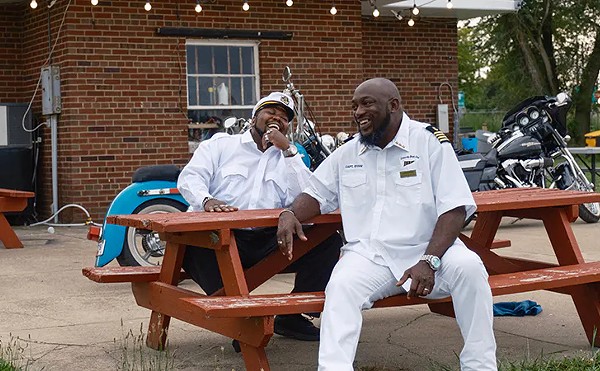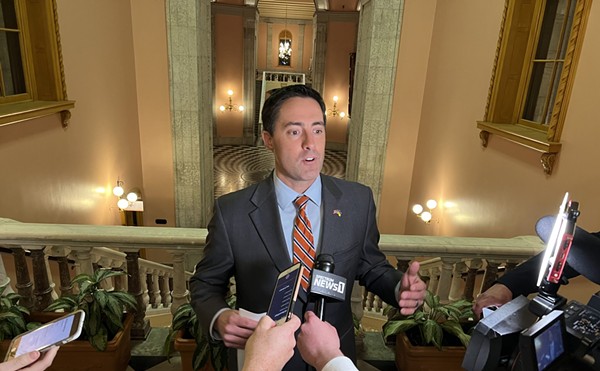But they also understood how faith is a fragile, necessary thing.
In 1962, when the Auschwitz survivors followed family to Cleveland, the first thing they did was seek out other Jews. There was familiarity -- the comfort of the Sabbath, of meeting people who knew their customs, their laws, their sense of aching loss.
The couple settled into a daily routine in Cleveland Heights. Anchel worked as a vending machine repairman. Chaya cleaned the house and managed the household finances.
They were frugal -- the type who drove 20 miles to save 15 cents. They wore sweaters until they frayed, walked to the grocery to save gas, and decorated their home with the leftovers John Carroll students threw on the tree lawn.
"There are two extremes with Holocaust survivors," explains Gordon Weiser, the couple's accountant. "There are the people who went through torment and torture, and always felt hungry. So, when they made money, they spent every penny on themselves. mselves."
Then there are the hoarders, who are "afraid that someday, someone is going to come and take away all of their land," Weiser adds. "They're constantly trying to prepare for that day. So they put away everything in preparation for disaster."
The Lebovitses were decidedly in the latter camp.
By the late '70s, the couple had saved enough to purchase a compact two-family home in University Heights. A decade or so later, as they neared retirement, they posted an ad looking for a friendly Jewish tenant to occupy the upper floor. In exchange for cheap rent, the Lebovitses wanted someone to watch over them and help with household chores.
Larry Zaslov was a chubby, jovial man with a buzz cut, a goofy smile, and no shortage of charm. He worked part-time as a computer technician. His wife, Danene, taught mentally and emotionally handicapped kids during the day and Hebrew school at night. The couple and their two young children seemed like perfect renters. They moved right in.
The Lebovitses adored the Zaslovs -- especially Larry. "Anchel and Chaya really thought he was like the son they were missing," Weiser says.
And the Zaslovs treated the Lebovitses like family, driving the couple to the doctor, the grocery store, and the kosher butcher. The Lebovitses, who spoke Yiddish, never really took to English, so the Zaslovs helped them with prescriptions and mail.
But behind Larry's warm brown eyes lay an unstable man who was always plotting. "I'll give him one thing," says his mother-in-law, Diane Legarth. "He's a smooth criminal."
In 2005, the Lebovitses' peaceful life disintegrated. Chaya's health began a rapid decline. There were problems with her arteries, and she developed cataracts. Anchel was forced to put his wife in a nursing home. Then he began making plans to move to Israel. The couple's lasting wish was to spend their final days in the Jewish homeland.
A social worker at the nursing home suggested that Anchel write a will, so he asked Zaslov to find a Yiddish-speaking lawyer. The tenant called Jewish Family Services, which supplied him with one name: Harry Brown, an attorney at Benesch, Friedlander, Coplan & Aronoff downtown.
Brown -- a round, serious sort with the look of a Talmudic scholar -- learned that Anchel had no close family in Cleveland. He was concerned that if his new client died suddenly, no would could take care of his affairs. He needed someone to act as the elderly man's power of attorney.
Larry Zaslov had chauffeured Anchel to the meeting that night. He seemed the perfect candidate -- a well-mannered, caring neighbor. "My uncle was a lonely person. He trusted only one person: Larry," says David Lebovich, Anchel's nephew. Zaslov was placed in charge of the Lebovitses' affairs.
For a vending machine repairman, it turned out to be a rather impressive estate. The couple's frugality had created a net worth of more than $1 million.
Zaslov's advisory role would be significant, Brown said, so it would be only right to compensate him. The lawyer suggested that Anchel leave Zaslov his house upon death, pay him $100,000, or perhaps both.
But Anchel grew to distrust the lawyer, finding his work subpar. Brown drafted a will that left out nieces and nephews Anchel wanted included. When the old man complained, Brown said he'd prepare a new one -- at an additional cost.
According to a later deposition, Anchel called Brown a "crook" and contacted Jewish Family Services to find another Yiddish-speaking lawyer. There weren't any.
And though Anchel loved Zaslov, $100,000 was a large payment between friends. "He has taken care of me," Anchel later admitted. "It's not nice to sell everything and move away and give him nothing."
But on the other hand, "I have to have money to support my wife . . . $100,000 is too much."
Behind the scenes, big shots at Benesch Friedlander weren't happy with the will either. In a phone message to Brown and other Benesch lawyers on February 24, 2005, Jeffrey Weiler, the firm's estate-planning expert, said he was "very concerned" about the Lebovits plan. It looked like "a sure bet for litigation."
For one, Zaslov wasn't Anchel's immediate relative. Weiler was concerned how Anchel's relatives would react to the firm's placement of an outsider as financial controller. "The concern I have here is undue influence and Larry being accused of undue influence and, possibly, you being accused of undue influence," he told Brown.
Moreover, Anchel's family was anxious to help. David had offered to fly from Ottawa, Ontario to examine the documents, but Anchel said no.
A month later, when Zaslov and Anchel arrived at Brown's office to complete the final paperwork, the meeting didn't go smoothly. In the conference room, Anchel announced that he wouldn't be giving Zaslov $100,000. He'd dropped the payment to $50,000 -- and it came with heavy stipulations. Zaslov would only receive the money if he took care of the Lebovitses until their death or entrance into a nursing home. Since Anchel and Chaya were moving to Israel, there was a chance Zaslov would receive nothing.
Toward the end of the hour-long meeting, Anchel was given power-of-attorney documents to sign. The papers would allow Zaslov to sign financial documents, take money out of Anchel's account, and sell real estate -- all without Anchel's approval.
"You have to be very careful who you give this power to," says Bob Whitman, an estate-planning expert and law professor at the University of Connecticut. "You have to trust the person implicitly." It's also a power that should only go into effect when the person has lost all mental capacity, Whitman says.
But lawyers at Benesch didn't explain this to Anchel, according to a tape of the meeting, saying only that Zaslov would be allowed to "act on your behalf." The document, however, granted Zaslov immediate control over the estate.
If the old man had been aware of Zaslov's past, he wouldn't have given him a ride home in the rain, much less control over his life earnings.
Larry Zaslov and Danene Legarth met at a club in 1991. Though Larry was almost a decade older, there was instant attraction. Danene found him charming and considerate. Larry admired her Goldilocks hair and calming presence.
When they married a year later, Zaslov inherited a horde of loving in-laws. "He seemed like a great person to have around," says Danene's sister, Danielle Jablonowski. If you needed a computer fixed, you called Larry. Need help with finances? Larry was the guy. He seemed to know a little bit about everything.
Though Danene's brother, Joe Legarth, found Zaslov a bit on the "snaky" and "untrustworthy" side, Danene's parents, Diane and Butch, fell in love with their new son-in-law. He treated their daughter like royalty and became the family's anchor.
In 1997, when Diane's flower shop floundered and officers came knocking on her door to repossess her home, Zaslov was the first one Diane contacted. He jumped to action. His cousin was a lawyer, he told Diane; they'd sort everything out. Diane was relieved. "I thought, 'What a great son-in-law,'" she says.
To cover bankruptcy filings and set things straight with the IRS, Zaslov told his mother-in-law that his cousin needed amounts totaling $25,000. Then he asked for $8,000 more. Diane didn't have that sort of money, so she borrowed it from her mom. Anything to get out of this horrible situation.
But Zaslov's last-minute maneuvers didn't work. Diane still lost her home. To help, Larry bought it at a sheriff's auction, promising to transfer ownership back to Diane within a year. In the meantime, Diane could pay the $450 mortgage herself. She'd often tack on an extra $50 or $100 to build equity.
Around the same time, Jablonowski refurbished an old West Side bakery. She prepared herself mentally for the normal opening jitters, like delayed construction and messed-up inventory. She was not ready, however, to find an IRS notice taped to her door one morning, saying she owed $8,000 in back taxes. Jablonowski flipped out. "I always paid my taxes," she says.
She too turned to Zaslov, who promised to clear up the matter. And he did. A few months later, she got a call from her brother-in-law. He was at the IRS office and had just written a check for $9,000. She was free. All she had to do was reimburse him.
Jablonowski was a bit suspicious. "Why don't I just come down there now?" she asked. But Zaslov insisted it would just slow the process. Jablonowski didn't want to argue. "Larry had a mean side," she says.
So she wrote him a check. Then she asked for a receipt. "The IRS doesn't give receipts," Larry told her.
That didn't seem right, but Zaslov sounded so convincing. Besides, "Why would he lie to me?" Jablonowski asks. "We were family."
She knew that Zaslov had always been good to her family, especially to her elderly, childless aunt Dorothy, a widow who lived alone in a big house on the West Side. Larry would often visit, bringing lattes and frosted doughnuts. The old woman looked forward to his visits, and with Zaslov there all the time, it took pressure off the rest of the family.
But Dorothy's health had begun to fail. It became obvious she'd need round-the-clock care. The family started looking into nursing homes. Naturally, the subject of wills came up. With Zaslov being so close to Dorothy, it seemed appropriate he be granted power of attorney over her affairs.
One of his first moves was to put her house on the market. It sold for around $100,000. But Zaslov secretly pocketed the cash without telling the rest of the family. He kept assuring them that everything was under control. And then it all began to unravel a few months after Dorothy died in 2005.
Diane Legarth was close to Walter Martens, the man arranging Dorothy's funeral. As a flower-shop owner, Diane had worked with him for 30 years. A few months after Dorothy's death, she checked with Martens to make sure everything was paid. That's when the shock came: Martens hadn't seen a dime.
Zaslov was supposed to have handled it.
Diane left a message for her son-in-law. Then she called her sister, Patsy Olasky, to update her on the matter. Olasky sounded brusque; the funeral director must be mistaken, she insisted. A few months back, Olasky had hand-delivered a check for $3,000 to Zaslov to cover most of the funeral costs.
Diane now realized something was very wrong. In all the years of working with Martens, he'd never lied to her, never cheated her on a bill. She began to wonder whether the same could be said for her son-in-law. She talked it over with Jablonowski; the two decided to investigate.
Diane's first thought went to her home. Zaslov had never transferred the title back to her. A lien search revealed that he'd taken a second mortgage on the home. All those extra equity payments had amounted to nothing.
Furious, Diane contacted her former bankruptcy lawyer. "I'm just curious," she told him. "I gave Larry over $25,000 in legal fees for the bankruptcy case. He told me you had the receipts. I was hoping to get a copy of them." The lawyer looked at her in shock. He'd never received a penny.
Finally, Jablonowski called the IRS, but she must have known what she'd find: There never had been a debt for back taxes, nor had Zaslov ever paid the agency $9,000. And the IRS always gives receipts.
Shamed and embarrassed, the Legarths had to face the truth: Danene had married a con artist. "We were just in complete shock," says Jablonowski. "He had pulled it off for so long."
"How can someone do this to their family?" asks an incredulous Diane.
April 2005
At the Lebovitses' home, Zaslov sat around steaming.
He'd just received the newest copy of Anchel's estate plan in the mail, and he was not happy to learn that his compensation had fallen from $100,000 to $50,000 -- with a chance he might be left with nothing. Moreover, Anchel was heading to Israel, and Zaslov would be left with the financial work. This was wholly unfair.
"I am doing all this stuff for Anchel, and it has been a big pain in my butt, and the only thing I am getting out of it is a lot of work," he complained in an e-mail to Anchel's Israeli niece, Ronit Shapira.
The two began corresponding when Anchel made plans to stay with Shapira in Israel for a bit. "The lawyer told me Anchel gave me the house because he said I was like a son," Zaslov wrote. "Then he changed his will and gave me $100,000 again . . . and then he changed it again and left me with $50,000, and who knows what I get now."
Zaslov decided to do something about the injustice.
A day before Anchel's scheduled departure to Israel to look for housing, Zaslov contacted the old man with urgent news. Administrators at Chaya's nursing home had called. They were concerned that with Anchel leaving the country, Chaya's bills might go unpaid. They wanted $300,000 as a deposit in case he decided to leave Chaya in their permanent care, Zaslov said.
Anchel began to fret, but Zaslov calmed him down. Don't worry, he said, I'll take care of it. All Anchel had to do was sign over a $300,000 check. Anchel obeyed.
On April 12, Zaslov deposited the check in a new account -- in his name -- and started spending like the newly rich. He burned through $10,000 on plane tickets, $500 at an East Side salon, and $1,000 at Nordstrom's. He bought a big-screen TV and paid off $6,000 in credit-card debt. He also became a generous benefactor, giving his parents $8,000 and a friend $5,000.
All the while, he continued to pen sweet e-mails to Israel, assuring Anchel that everything was kosher. "I am going to spend the next few nights with Chaya at the nursing home for Passover, because I care for her and she tells everyone I'm a wonderful son and I love her," he wrote to Shapira.
A month later, Anchel decided it was time to move Chaya to Israel. He'd found a lovely place for them. All he needed was someone to help her get overseas. Zaslov volunteered, suggesting his parents come too, since Chaya could be difficult. He charged four first-class tickets to Anchel's account. The group had a lovely time sightseeing, while Zaslov kept his bitterness hidden.
But problems remained back in Cleveland. He would still have to sell Anchel's home -- which would force his own family to move as well. He'd never find such a big place with such cheap rent. But Shapira kept pushing for the sale. It was Zaslov's job to arrange it.
"It will take at least 6 to 8 months to sell the house," he wrote Shapira. "The reason for that is I am not busting my butt every day to try and get this done. It will get done, but when I get a chance."
When Shapira pressed him again a few weeks later, he claimed the home had been appraised, but the results were disheartening. Contractors told him it would cost "$79,047.00 to fix everything that's wrong."
A few days later, Zaslov moved $80,000 from Anchel's account into his own, according to bank records. But nothing was ever fixed.
As Shapira became more anxious, Zaslov responded with ever better excuses for the delays. He wrote that he was "having major problems with the house; the inner basement wall is damaged, and it could cause the whole house to move. We have been asked to move out and go to a hotel until the problem is corrected -- it's a big mess. The more they fix, the more they find wrong."
But there were no repairs taking place, and Zaslov had already put the house up for sale. He was soon contacted by Richard and Barry Long, real estate developers with a particular interest in University Heights.
The Longs offered $125,000 -- roughly $65,000 less than it was worth, according to estimates by James Rosenblatt, an appraiser at Park View Federal Savings Bank. But there was a small problem. The home was jointly owned by Chaya and Anchel, and Zaslov only held power of attorney for Anchel.
Zaslov discovered a way around this, but it wasn't exactly legal. He used a boilerplate power-of-attorney form from the internet, then forged Chaya's name and signature on all 10 pages of the document, he later admitted.
The Longs now had everything they needed for the sale. On June 10, 2005, Zaslov sold the house for $125,000. With money from the sale, as well as cash from Anchel's account, he bought his family a $203,000 home in University Heights, paid for in cash.
Meanwhile, he continued to write compassionate, loving e-mails to Shapira.
Misfortune and bad luck came in short order for the Lebovitses. In July 2005, Chaya passed away. A month later, a slew of funeral bills arrived. Anchel sat, depressed, in his niece's house. Suddenly, Zaslov stopped responded to Shapira's e-mails. On the few occasions he did, he always had valid reasons for the delays.
First he claimed he'd been diagnosed with stomach cancer. Then his father was on his deathbed. Then his uncle died.
How much tragedy can befall one family? Shapira wondered. She began scrutinizing his words, questioning her uncle's finances. Where was the $300,000 deposit for the nursing home? How much money went to fix the house? Where were Chaya and Anchel's Social Security checks?
Toward the end of the summer, she began to get an ugly feeling. She contacted Mark Hoffman, a Cleveland lawyer, who rummaged through court records and found the deed transferring the Lebovitses' home to the Longs.
Shapira felt sick. She wanted to lash out at Zaslov, to beat him with her words. But her attorneys suggested she play dumb. They wanted to record a few telephone conversations and trick him into confessing.
On October 4, 2005, Shapira called Zaslov to ask whether the house was sold.
"No, not yet," he responded.
"That is bad," said Shapira. "Do you know more or less when it will happen?"
"I don't know. I have a six-month contract with the real-estate agent."
The lies rolled easily off his tongue.
A few weeks later, Hoffman and fellow attorney Kevin Roberts filed suit against Zaslov and his wife for embezzling more than $500,000.
In April of 2006, they also sued Benesch Friedlander for malpractice. (The suit was settled for an undisclosed amount last fall.)
A month later, they filed another suit against the Longs, in hope of retrieving the Lebovitses' home. "The defendants, as experienced real-estate investors, facilitated the fraud by purchasing valuable property for less than two-thirds of its value under suspicious circumstances," the lawsuit claimed. They wanted the sale voided due to fraud. The trial is scheduled for fall.
In the meantime, Anchel, relatively healthy at age 84, remains in Israel with Shapira, waiting for the outcome of his legal travails with a new companion: a dog. At least that animal won't screw him over, says niece Frida Markle.
University Heights police are investigating Zaslov, but he has yet to be charged with any crime. Anchel's suit against him languishes in probate court.
Zaslov's newfound riches seem to have quickly disappeared. Last month, Danene filed for divorce. (She refused to comment for this story.) Zaslov now lives with his sister in a shabby little house in South Euclid and is behind on his child support.
On a recent night, he bounded up the stairs, his expression cool even after discovering a reporter at his door. He claimed the $300,000 deposit was actually a gift, and that Anchel had approved the sale of the home.
"Everything will be cleared up soon," he said confidently, then politely closed the door.












